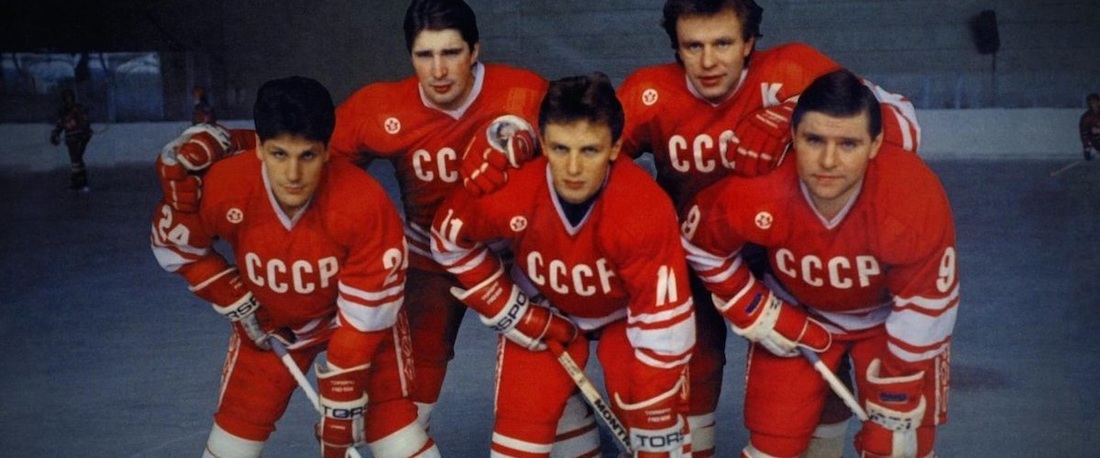Rating: 4 out of 5 starsGenre: Documentary Run Time: 1 hours 16 minutes, Rated PG Starring: Vyacheslav Fetisov, Scotty Bowman, Alexei Kasatonov, Ken Kurtis Written and Directed by Gabe Polsky (The Motel Life) Red Army (opening today) was not nominated for an Oscar, nor did it even make the short list of 15 documentaries that the Academy creates to pick their nominations from. At 76 minutes, it might have been considered a bit slight, and not as socially immediate as other "important" docs such as Virunga or CitizenFour, the latter of which actually took home the Oscar. But Red Army is a must-see sports documentary, not only for fans of hockey, but even more specifically, for the "HockeyTown" fan base of my hometown, Detroit, MI, as it is basically gives a biographical history of Slava Fetisov, one of the beloved members of the Stanley Cup winning Detroit Red Wings. The film is set against the backdrop of the Soviet Union and the Cold War and it first, it seems like it will be a politically-motivated film. But it slowly morphs into an underdog story, which is an age-old sports adage that many will be able to relate to. A young Vyacheslav "Slava" Fetisov grew up poor, as many did, under the iron fist and behind the iron curtain of communist Russia. As the film explains, hockey is way more than just a sport in the U.S.S.R., it is considered an actual wing of the federal government, a "Red Army" machine used as propaganda to show their citizens and the rest of the world that Russia is far superior to other countries in the world. Government officials and KGB members would sift through the millions of Russian citizens, plucking the best of the best athletes, for a spot on their Red Army Hockey Team.
Fetisov worked diligently to become one of these elites. He quickly went on to become one of the best - if not the best - Russian hockey player the world had ever seen up to that point. But he - and his comrades on the ice - were kept in check and held tightly under the thumb of their superiors. If you ask Red Wings fans about the "Russian 5," they will quickly tell you about the impressive group of Federov, Kozlov, Konstantinov, Larionov and Fetisov, that dominated and re-invented hockey as us Americans had known it, on their way to eventual back-to-back Stanley Cup Championship wins in 1997 and 1998. But the phrase actually dates back earlier, when Fetisov skated alongside the world-dominating group of Alexei Kasatonov, Sergei Makarov, Igor Larionov and Vladimir Krutov on the Red Army team (and oh yeah, they played in front of goalie Vladislav Tretiak, who to this day, is known as the best goalie ever to live, even though he never played a game in the NHL). In the film, Fetisov talks with great fondness and respect for his mentor, the legendary Anatoli Tarasov, who was replaced as the Head Coach of the Russian National team only a year or so before their trip to the 1980 Lake Placid Winter Olympic Games. The new coach, Viktor Tikhonov, an ex-KGB thug and total son-of-a-bitch, took over and was helming the bench heading into the now legendary Games. Because you have to understand, the Russian hockey teams of that era were not only great, they were undefeated for long stretches that lasted several years in the late 1970s and early 1980s. Americans know all about the "Miracle on Ice" Olympic upset victory over the Russians at the 1980 Lake Placid Winter Olympics, but getting some background, and putting some faces to the gigantic Russian bodies of our enemies, really puts it into perspective just how big of a miracle their defeat was. But the documentary doesn't linger on the Lake Placid Games. As the 80s churned on, the fall of the Soviet Union led to unheard-of freedoms for many Russians, with several big-name hockey players moving state-side for a chance at glory in the NHL. To think that these players just simply picked up and left is ridiculous. As Fetisov details for us, his eventual jump across the pond was an excruciating journey that almost never happened, due to political powers-that-be blocking his every attempt and refusing to move forward from the past. Writer/Director Gabe Polsky has a real knack for story-telling, although Red Army does initially feel like it's going to be a deeper and more comprehensive look at Cold War Russia. Polsky creates great, uncomfortable moments by just letting the camera linger on his subjects, and we are told just as much about them when their lips aren't moving as when they are. Fetisov, in particular, comes across as quite the character, a brute force off the ice as he was on it. Seeing him try to dodge a few questions, telling Polsky that he is asking the wrong questions, or blowing off the interview all-together to take a phone call, Fetisov shows that he is a worthy subject for a feature film. Much of the story that is being told feels incomplete though, with Fetisov front and center and many of the other big names missing. Tikhonov, for example, is said to have refused an interview for the film. Only a few other Russian players are interviewed, and Detroit-favorites are under-used (like Head Coach Scotty Bowman) or missing altogether (Larionov, Federov, Koslov, where are you?). The story chooses to stop with Fetisov's Stanley Cup win in 1997, but Detroit fans know that that victory was short-lived, when just days after the win, Fetisov was in a limo accident that left teammate and fellow Russian Vladimir Konstantinov debilitated. There is no mention of this in the film, which is a bit surprising, considering that Fetisov was also involved in a fatal car crash earlier in his life. What this really illustrates is how we can't judge a book by its cover. When the Russian players came over following the collapse of the Soviet Union, many were hated or victimized. None of us, perhaps until now, even knew a tenth of what players like Fetisov had to go through in order to suit up and play the game that to many of us, is just entertainment or hobby, but to others, is a lifeline to a better existence. I can't express this enough: Red Army needs to be seen, especially by those who only know Fetisov as an "old man" on the back-to-back Stanley Cup Champion Red Wings teams in 1997-1998. It's an eye-opening look inside a culture not familiar to many and another example of how sport can change the world.
0 Comments
Leave a Reply. |
Looking for a specific movie or review?
Search Below: Categories
All
Archives
May 2024
|
tom santilli movie reviews
Tom Santilli is a professional film critic, TV personality, host and
the Executive Producer of Movie Show Plus.
He also is the featured film critic appearing on WXYZ Channel 7 Action News in Detroit,
and appeared weekly on FOX-2 in Detroit from 2016-2020.
Feel free to use the "search" below to find your favorite titles.
TOM'S GRADING SCALE:
B- and above: Thumbs Up
C+ or below: Thumbs Down
Currently Airing:Check Local Listings
|
For more information on Movie Show Plus, Email: |


 RSS Feed
RSS Feed
